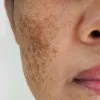World's Most Advance & Effective Treatment For Melamsa, Freckles & HyperPigmentation. Headover to HASH CLINICS to get the Treatment OR Speak to our Experts Now:
0330-3412233




Pigmentation is the existence of excess melanin on the skin, causing an uneven skin tone resulting from a genomic mix-up of the person’s biological parents’ genes. Skin pigmentation marks are characterized by the built-up melanocytes, which are cells including melanin. These usually occur under the skin and are described as age spots on the face, hands and body area, and freckles.
The most common misconception linked with discoloured skin is that it will fade by itself without undertaking any treatment whatsoever. Some pigment types, like the ones affected by acne, may lighten up over time. But, the majority of discoloured skin needs to be treated with in-office and high- powered active ingredient treatments like those provided by our experts to fully remove the skin spots on the surface.
To be an ideal candidate for these treatments, you will have to meet a few conditions. Firstly, you must be in good physical form. Some of the techniques to treat pigmentation require you to be healthy, so you can recover well after the treatment. Ideal applicants should meet certain other criteria:
They must follow a good skincare routine
They must be non-smokers as they show better result
They must be able to stick to strict usage of sunscreen application
They must not have any kind of skin condition like an active viral skin infection
They must have less exposure to the sun
Our clinic’s professional and experienced doctors use laser treatment to treat pigmentation. It is a safe and effective way to treat skin pigmentation. Our professionals use a laser device to send wavelengths into the affected areas of your skin.
The laser wavelengths damage the damaged skin cells and reduce pigmentation. This procedure has no harmful side effects, and the result can be seen quickly. These days, the Q- switched laser devices are used for their innovative features. The laser wavelength used is Q- switched laser, which helps to break the pigment cells and eliminate them from the body naturally.
It requires no interruption and will not result in improved sensitivity to the sun. However, it requires more sessions, but you can expect to see improvement after each session. Other than helping to treat pigmentation, the Q-switched laser also enhances the overall skin brightness, texture, and tone. It must be performed in a registered clinic like our clinic under the supervision of an experienced dermatologist available at our experienced doctors to achieve the best possible results.
The two major reasons for skin pigmentation are sun exposure and hormonal changes. Hormonal changes are very widespread during pregnancy and if you have particular health conditions. Some medicines are also known to have hormonal changes as a side effect. These can lead to pigmentation.
Sun exposure as well can lead to pigmentation on the skin, especially on areas that are directly exposed, like your face, hands, and neck.
If you notice an uneven color on your face, seeing one of our experienced and skilled dermatologists can be helpful. We can tell you whether you have Melasma or another condition and what may help you see clearer skin. Our dermatologists can diagnose Melasma by looking closely at your face and neck.
Sun exposure as well can lead to pigmentation on the skin, especially on areas that are directly exposed, like your face, hands, and neck.
We might use a specialized device like a dermatoscopy to get a close-up look. Placed on (or near) your skin, these devices help our experienced dermatologists see how deeply the darker pigment reaches into the layers of your skin. This knowledge is particularly helpful if you want to treat Melasma. Sometimes Melasma can look like another skin issue. To rule this out, we also perform a skin biopsy, including removing a small amount of skin. Our qualified doctors can safely and quickly perform a skin biopsy during your office visit.
Melasma may go away on its own. This usually happens when a trigger, such as pregnancy or a medication, causes Melasma. When you deliver your baby or stop taking the medication, Melasma can fade. Melasma can also last for years or even a lifetime. While Melasma cannot damage your body, it’s understandable that many people want to treat it.
If you want to treat Melasma, be sure to ask our dermatologists about the cost of treatment. As treatment for Melasma is not thought medically necessary, most insurers will not cover the cost. If you decide to treat Melasma, we will create a treatment plan customized to your needs. This means your plan will consider your skin tone, how deeply the Melasma extends into your skin, and any melasma triggers you may have. Sunlight, taking birth control pills, and even stress can trigger Melasma. The goals of treatment are to:
Even out your skin tone, restoring it to your natural color.
Decrease how much pigment your body makes. To achieve these goals, a treatment plan often consists of the following:

Do your freckles affect your self-confidence and self-esteem? If so, many avoidance tips and treatment options can help reduce them in look or have them completely removed. The qualified and experienced dermatologists at our clinic can help with this.
Freckles or ephelides closely look like the solar lentigines. The former happens as a result of excess production of melanin, while the latter is a consequence of an increase in the quantity of melanin- producing cells, i.e., melanocytes as well as melanin.
Freckles are a consequence of a genetic predisposition and sun damage affected due to excessive exposure to UV rays. The skin absorbs UV rays and generates excess melanin that causes pigmentation in small patches. Usually, people who are fair-skinned, with light eyes and blond hair, are more vulnerable to the harmful effects of the sun and the consequent formation of freckles. It is better to prevent freckle development than go for remedial treatment later. People with known hereditary inclinations should start sun protection early, as sun damage due to UV rays often occurs in childhood.
The following are the showing signs of freckle growth:
• It contains small spots ranging in color from light brown to dark brown.
• Appears more conspicuously in summers and fades away in winters.
• Mainly affects fair-skinned people.
• It may require any age group, from children to the elderly.
• It is current on sun-exposed areas; the central part of the face is the most common site.
Usually harmless, but if it appears on abnormal sites, like underarms, or is correlated with extreme sun sensitivity and flaking of the skin, then it can be a sign of genetic disorders, e.g., neurofibromatosis and xeroderma pigmentosum.
At our clinic, we offer multiple treatment options for freckles. Some of the treatment options include:
• Cryosurgery: Cryosurgery makes use of liquid nitrogen to freeze the pigmented spots on the skin to treat these freckles. On use, the liquid nitrogen forms a wound by causing controlled damage to the skin and removes excess melanin.
• Chemical Peels: This treatment procedure helps to eliminate freckles by exfoliating the sun-damaged skin in a controlled manner. Our dermatologists recommend an advanced aesthetic treatment using medium-depth chemical peels, including either glycolic acid or TCA, that penetrate beyond the surface layers of skin to remove freckles. The freckled layers start to strip away while generating new skin free from discoloration or pigmentation. Our experienced dermatologists might advise contrary to direct sun exposure and suggest the use of sunblock along with other topical medication post- treatment.
• Intense Pulsed Light Therapy (IPL): This is another light-based treatment alternative for treating freckles at our clinic. IPL uses bursts of high-intensity polychromatic light of different wavelengths to target areas abundant in melanin content in difference to lasers which utilize a single wavelength of light.
• Sun Protection: Using sufficient sun protection with sunscreen is compulsory for the therapy of freckles as they can prevent repetition and help in maintaining the results attained after various treatments.
130-C, DHA Phase 1, Near Tooba Masjid, B-Commercial Area, Karachi.
PHONE: 0330-3412233
Skin Care: 0330-3412233
Hair Transplant: 0327-3412233
Orthopedic: 0335-7712233
Dentist: 0326-3412233
Erectile Dysfunction: 0325-3412233